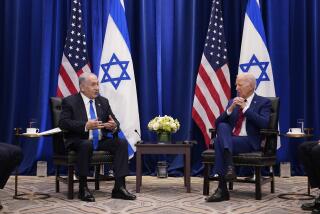Arafat, Israeli President Meet on Security
- Share via
JERUSALEM — Hoping to bring about a thaw in frozen peace negotiations, Israeli President Ezer Weizman met with Yasser Arafat on Tuesday night and said afterward that the Palestinian Authority president had agreed to renew security cooperation with Israel.
Arafat asserted after the two-hour session at the Erez crossing between Israel and the Palestinian-ruled Gaza Strip that “both of us should maintain security for both peoples. . . . We are totally committed to this issue.”
But while the statements struck a positive note for the arrival of U.S. peace envoy Dennis B. Ross today on his third trip to the region since peace talks broke off in March, it remained doubtful that the Palestinians would engage in serious security cooperation before Israel agrees to resume political negotiations.
The meeting between Weizman--whose post is largely ceremonial--and Arafat was the highest-level contact between Israel and the Palestinians since Israel began construction on a new Jewish neighborhood in traditionally Arab East Jerusalem.
Islamic extremists responded to Israel’s bulldozers by blowing up a Tel Aviv cafe March 21, killing three Israeli women. Israel then officially suspended peace talks, and the Palestinians halted the intelligence cooperation Israel feels is necessary to fight terrorism.
Weizman said he initiated the meeting with Arafat in the hopes that it would break what is considered to be the worst deadlock in Israeli-Palestinian negotiations since the two sides signed their landmark peace accord in 1993.
The Israeli president used a similar tactic last year, forcing a reluctant Prime Minister Benjamin Netanyahu to meet one-on-one with Arafat by suggesting that he would do so if the prime minister did not. That led to negotiations and, eventually, a hard-fought agreement for the redeployment of Israeli soldiers from most of the West Bank city of Hebron.
Political observers and the Israeli military consider the current crisis to be much deeper even than the one that preceded the Hebron deal. Palestinians say Netanyahu is trying to preempt final negotiations with the construction in East Jerusalem, which Palestinians want as the capital of an independent state. They believe that he is trying to do away with the peace accords signed by the previous government.
The Israelis believe that the Palestinian leadership has given extremists the go-ahead for terrorist attacks such as the cafe bombing and for violent street demonstrations to pressure Israel--tactics they view as antithetical to peacemaking.
Netanyahu has said he will not stop the construction and will not negotiate unless the Palestinians cooperate on Israeli security. The Palestinians have said negotiations cannot take place while the bulldozers are working and security cooperation cannot resume without political negotiations.
U.S. officials believe that both sides have been looking for a face-saving way to get back to the table. Before the meeting, Israel Radio reported that Netanyahu had decided with Foreign Minister David Levy and Defense Minister Yitzhak Mordecai that Israel was prepared to resume negotiations if Arafat would order the resumption of intelligence cooperation.
Israeli newspapers reported that the government was considering several “confidence-building measures,” such as building housing for Palestinians in Jerusalem, increasing the number of Palestinian workers allowed into Israel, allowing construction to proceed on a Palestinian airport and seaport, and opening a “safe passage” between the Palestinian-ruled West Bank and the Gaza Strip.
Netanyahu spokesman David Bar-Illan dismissed the reports as “speculation,” but a U.S. official who asked not to be identified called them “trial balloons” aimed at the government’s own conservative coalition members.
Weizman reportedly was briefed on these possibilities by government ministers before his meeting with Arafat. It was unclear whether he was authorized to make any formal offers or promises, but Netanyahu aide Yitzhak Molho, an attorney who has served on the Israeli negotiating team, also sat in on the talks.
Weizman said he stressed that Netanyahu was the one elected to lead the country and that Arafat would have to negotiate with him.
Israel Radio reported today that Arafat told Weizman that he would allow contacts between Palestinian and Israeli security services with the participation of CIA officials.
The collapse of the Israeli-Palestinian peace negotiations has provoked tensions between Israel and the rest of the Arab world.
That became evident again Tuesday when a meeting between Netanyahu and Crown Prince Hassan of Jordan was canceled suddenly, ostensibly over a water dispute.
Netanyahu called the disagreement a “mini-crisis” and later telephoned Jordan’s King Hussein to try to address the dispute.
More to Read
Sign up for Essential California
The most important California stories and recommendations in your inbox every morning.
You may occasionally receive promotional content from the Los Angeles Times.













